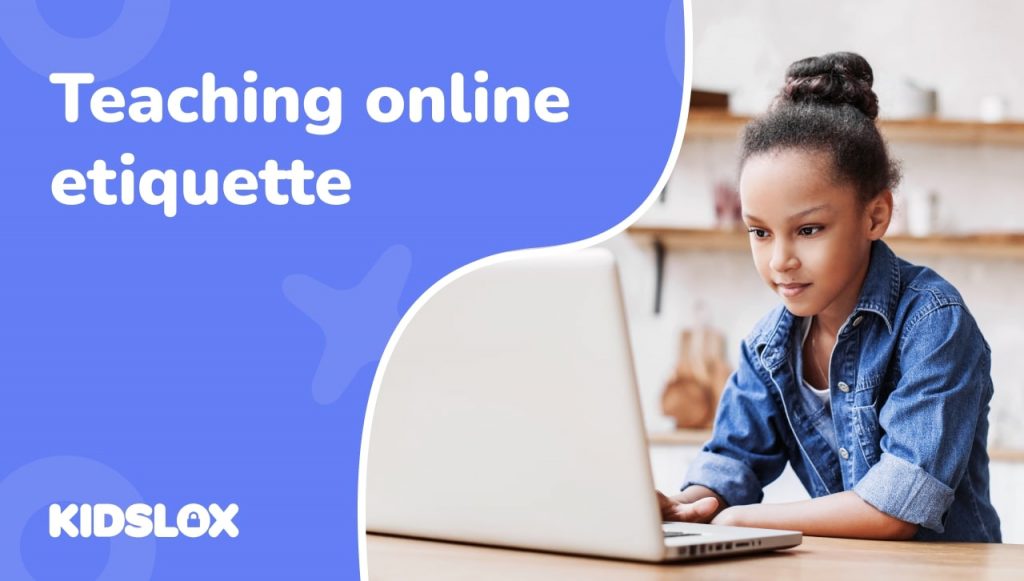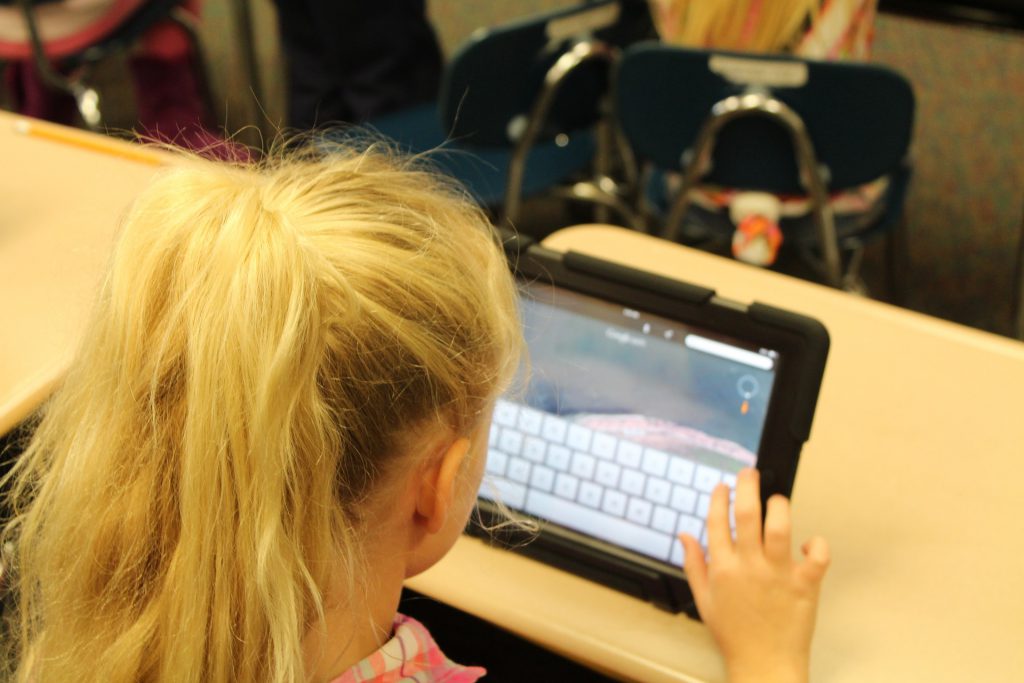All responsible parents want their children to behave in a manner that’s respectful, kind, and courteous to people around them. Most of us would be horrified to see our kids be rude to someone, or to have the school call and tell us that they had been saying and acting in ways that weren’t appropriate. It’s easy to see if bad behavior is happening in the schoolyard, but what about what goes on online? How do we know that our children are putting forward the best version of themselves when they’re behind a screen?
When our children are in the digital world, we’re not always privy to what they’re doing. Whether it’s absorbing TikTok videos, chatting with school friends on Facebook, or playing video games, they are constantly engaging with others in virtual spaces. According to research by McAfee, 67% tweens (8-12 year olds) spend time on social media platforms, including Skype and Facebook.
With millions of these digital interactions happening every second, playing nice online helps keep spaces safe and friendly for everyone. Teaching your child the importance of online ettiquette is key for their wellbeing, both on and offline.
What is netiquette?
Beyond kindness and manners, good netiquette, or online etiquette goes beyond ‘Ps and Qs’ – it’s a set of best-practice behaviors that shape all of our interactions online. From handing in electronic homework to applying for first jobs and chatting with friends, the way we conduct ourselves in the virtual world matters.
The internet in all forms should be seen as an extension of our ‘real world’, and society. Tolerance of other people’s opinions, and cultural beliefs and respecting others’ personal space and dignity isn’t just about face to face manners. In this guide, we explore how to teach your kids the fundamental principles for behaving well online, to protect them from harm and foster good habits and digital etiquette for the rest of their lives.
Why is good netiquette important?
Modern life dictates that we spend a lot of time online, and that’s true for our kids too. Work and play extend online so a vital part of developing well-rounded communication skills is to kearn how to conduct yourself appropriately in the digital world.
When we speak, we can rely on watching body language, and the context of the situation, but these typical communication markers are often missing online. With this ambiguity and opportunity for misinterpretation, ensuring that we all follow simple principles for positive interactions helps prevent misunderstandings and unnecessary conflict. As we become progressively more digital with our social and work lives, teaching our children foundations for healthy and positive behavior online is a fundamental pillar of our relationship with society.
Unfortunately, trolling, bullying, and other unethical behaviors are commonplace online. From being unkind behind the relative protection of your computer screen to stealing other people’s property and work, there’s a lot to watch out for when it comes to behaving badly online.
Ten netiquette tips to teach your kids
The basic tenants of respecting other people’s opinions, culture, property, time and space are all fundamental to ensuring good online etiquette, but it goes beyond that too. Here are 10 things to keep in mind when teaching children ‘netiquette’.
1. Keep things private
If your child is using social platforms that you’re unfamiliar with, it’s a good idea to take some time to understand the privacy settings of the channels so you can help protect your children’s personal information. Most social networks are designed to have multiple layers of privacy, enabling you to set parameters on content right down to the level of individual posts.
For maximum privacy protection, your child should never connect, or make friends with someone online that they don’t know in real life, and their accounts should remain on ‘private’, so their content isn’t visible to anyone that they’re not officially connected to.
2. Password protection
Strong passwords are key to keeping hackers and other online troublemakers from accessing personal information from your child’s accounts. Make sure that your child knows how to set strong passwords and that they get into the habit of changing them regularly. That way you know that they are keeping their information safe, and doing their best to stop hackers or bullies from getting into their accounts and stealing information.
3. Be kind
The best test of whether you’re posting something appropriate is to ask yourself ‘would I say this out loud’, and ‘would I say it to someone’s face?’ If the answer is ‘no’, then that’s a good indicator that you shouldn’t write it online either. Teach your kids this simple litmus test of understanding if what they’re writing is appropriate. The internet can give us a false sense of bravado, which can lead children to do and say things that they wouldn’t typically do in real life.
4. Think of the person
Much like the previous point, when you’re staring at a screen and interacting with others digitally, it’s easy to disassociate the device with the person behind the screen. Teach your children that behind every screen is a person.
If they see someone being harassed, bullied, or picked on for whatever reason, they should report the behavior to the social platform using the available tools, and ensure that they inform a responsible adult about what they’ve seen too.
Treat people just like you like to be treated in real life, and you won’t go far wrong.
5. Online = forever
Without the benefit of hindsight and learning from the life experience of mistakes, it’s difficult for children to understand how something they do today can impact them later in life. Once we post something online, it only takes a single screenshot to start a cascade of events that make it impossible to delete. This can come back and bite us in the future when we’d rather forget our less than admirable childish behavior.
Children should be aware that nothing you share with others is ever truly private online. They should post only the things that they’re comfortable saying out loud, and only connected with people they know and trust.
Educate children about the permanence of internet content, and how everything from future job and university applications to friendships and relationships can be impacted by what you do and say online today.
6. Minimize the slang
Many experts believe that the incorporation of technology in our lives has resulted in us losing a grip on best practices with our speech and language offline. Exposure to too many abbreviations, acronyms, and internet-speak can start to creep into your child’s spoken, and written communications too.
What seems like harmless slang has the potential to limit the opportunities that children have to develop a well-rounded vocabulary and grasp of the English language. Make sure you encourage your kids to use full sentences, proper punctuation, and a wide variety of words in their online communications to stay literate offline too.
7. Encourage real-world socialization
So much of our communication as social beings is non-verbal. If your child is spending most of their time socializing online, they might miss these important cues, which can cause them difficulties with understanding others and their motivations. This is especially true for younger children. Encourage hobbies that are away from the screen, and set healthy screen time limits on the time that your child spends in front of their electronic device.
8. Don’t get carried away in ‘wars’
It’s important to teach children that it’s fine to share your opinion or engage in healthy debate, but sometimes ‘flame wars’ online can escalate and become harmful. These online disagreements can quickly become heated and ugly. With tempers running high, people can say things that they regret, and once said, they can’t be taken back. Ensure your children take the heat out of their online interactions and stay clear of engaging in arguments and fights online.
9. Stealing online exists
From downloading movies illegally, or taking other people’s pictures and using them without credit, it’s so easy to steal online – so much so that your child might not even be aware that they’re doing it.
However, there are consequences for taking other people’s digital property – viruses are easy to catch from unauthorized downloads, but it doesn’t stop there. The internet isn’t the free pick ‘n’ mix of content that it sometimes appears to be. Stealing copyrighted content can end up with very real punishments. Make sure your children know the difference and always get their entertainment from reputable, free sites.
10. Share your knowledge!
If you use the internet regularly then you’ll know how good a resource it is for learning about others and sharing skills. Your child will have their own unique skills and talents and sharing them with others is a great way to teach community spirit in a digital sense too. If you have something useful, interesting, and fun to share with others – do it! Just make sure your child is mindful to seek out other resources, and use the internet as a collaborative tool too.





